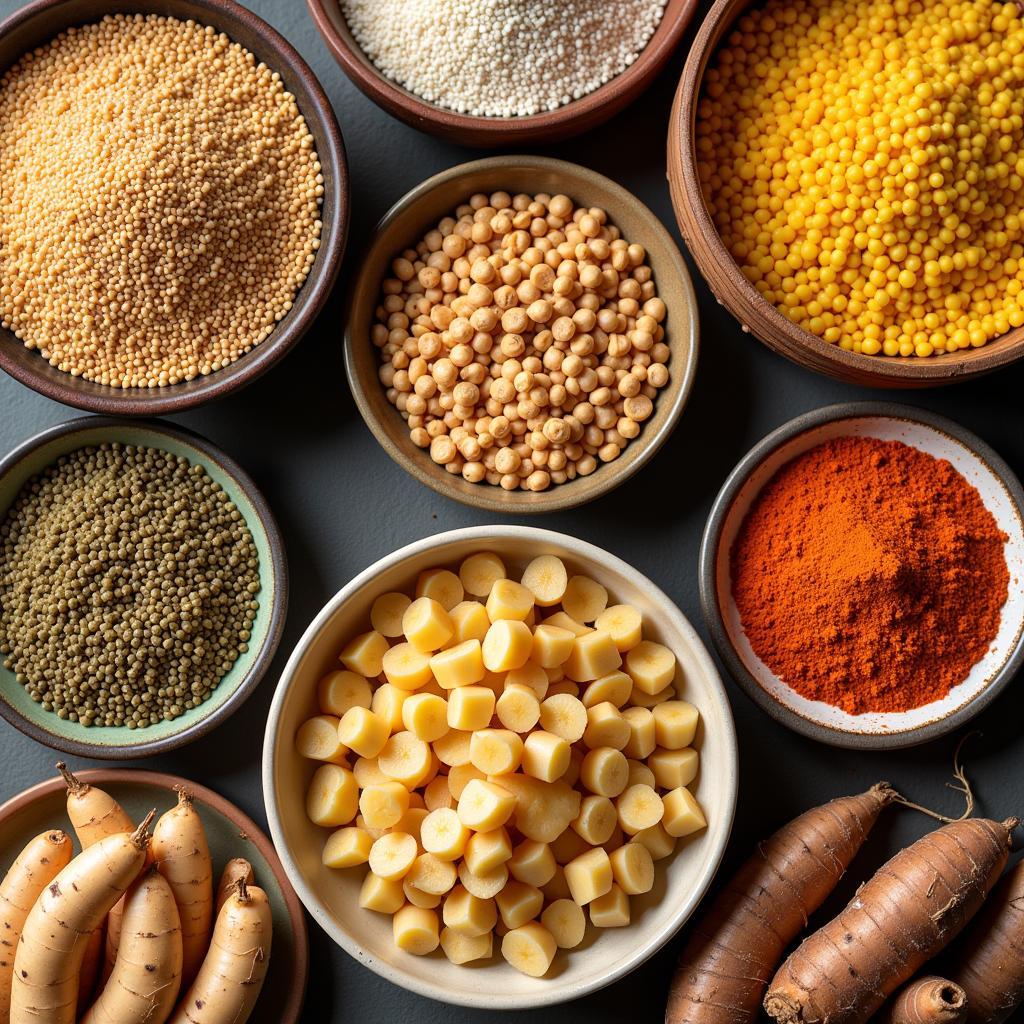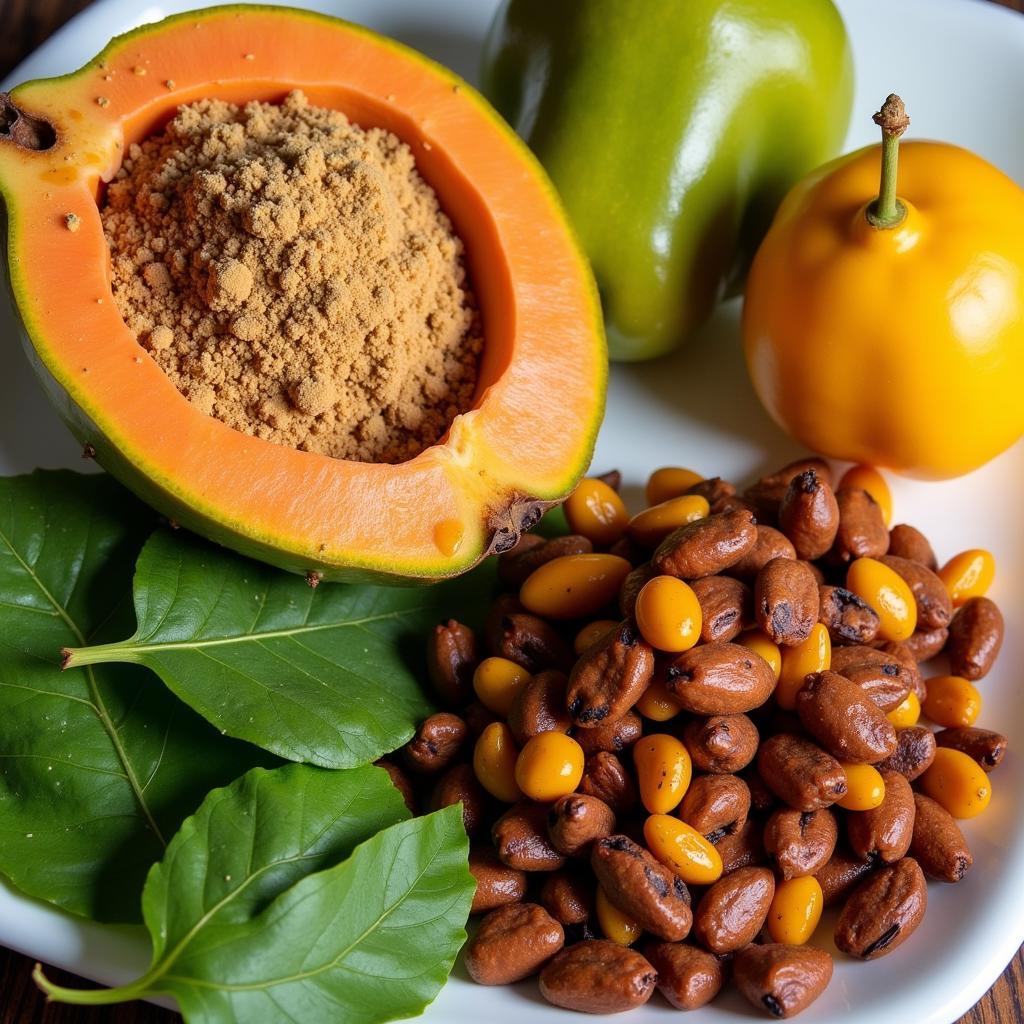Exploring the Diverse World of African Food Products
African Food Products offer a vibrant tapestry of flavors, textures, and aromas, reflecting the continent’s rich cultural heritage and diverse agricultural landscape. From staple grains like millet and sorghum to exotic fruits like baobab and ackee, African cuisine boasts a unique culinary identity that is gaining increasing global recognition. This article delves into the fascinating world of African food products, exploring their origins, nutritional benefits, and culinary applications.
After centuries of being overlooked, African food products are finally having their moment in the culinary spotlight. This resurgence is driven by a growing awareness of the health benefits of traditional African diets and a desire for unique and authentic culinary experiences. Learn more about where to find these unique ingredients at african food products wholesale.
Staple Foods: The Foundation of African Cuisine
Many African countries rely on a core group of staple foods that form the basis of their daily meals. These staples, often rich in carbohydrates and essential nutrients, provide sustenance and energy for millions. Among the most prominent are grains like millet, sorghum, and teff, which are ground into flour for various dishes like porridge, flatbreads, and couscous. Root crops like cassava, yams, and sweet potatoes are also vital, offering a source of carbohydrates and vitamins. Legumes, including cowpeas, black-eyed peas, and pigeon peas, provide protein and fiber, contributing to a balanced diet.
These versatile ingredients are prepared in countless ways, reflecting the regional variations and culinary traditions across the continent. From the fluffy fufu of West Africa to the hearty injera of Ethiopia, these staple foods are the heart and soul of African cuisine.
 African Staple Foods: Millet, Sorghum, and Cassava
African Staple Foods: Millet, Sorghum, and Cassava
Exotic Fruits and Vegetables: A Burst of Flavor
Beyond the staples, Africa is home to a dazzling array of exotic fruits and vegetables that contribute unique flavors and textures to its cuisine. Fruits like baobab, known for its tangy pulp rich in vitamin C, and ackee, a versatile fruit used in savory and sweet dishes, are just a few examples of the continent’s botanical treasures. Leafy greens like amaranth and moringa offer a nutritional powerhouse, packed with vitamins and minerals.
These unique ingredients add a touch of the exotic to African dishes, creating a symphony of flavors that tantalize the taste buds. From the zesty bissap drink made from hibiscus flowers to the creamy avocado pear salads, African fruits and vegetables offer a delightful culinary adventure.
 African Exotic Fruits and Vegetables: Baobab, Ackee, and Moringa
African Exotic Fruits and Vegetables: Baobab, Ackee, and Moringa
Spices and Condiments: Adding Depth and Complexity
African cuisine is renowned for its bold and complex flavors, often achieved through the artful use of spices and condiments. From the fiery peri-peri chili to the aromatic ras el hanout blend, African spices add depth and warmth to dishes. Fermented condiments like ogiri, a savory paste made from fermented melon seeds, and dawadawa, a fermented locust bean condiment, add umami notes and enhance the overall flavor profile.
These flavor enhancers transform simple dishes into culinary masterpieces, creating a symphony of tastes that are both comforting and exciting. Explore the world of african flavors for sale and elevate your cooking.
What are some popular African grains?
Some popular African grains include millet, sorghum, teff, and fonio.
Where can I buy African food products online?
You can find many African food products online through specialized retailers and marketplaces. You might also explore options for african food wholesale.
Are African food products healthy?
Many African food products are incredibly healthy, offering a rich source of vitamins, minerals, and fiber.
Conclusion: Embracing the Culinary Riches of Africa
African food products offer a unique and exciting culinary journey, showcasing the continent’s diverse flavors, textures, and traditions. From staple grains to exotic fruits and aromatic spices, African cuisine has something to offer every palate. By embracing these culinary riches, we can expand our culinary horizons and discover a world of flavors waiting to be explored. Don’t forget to check out the upcoming african food and products exhibition for a chance to experience these flavors firsthand.
FAQ
- What are some common African cooking methods?
- What is the significance of food in African culture?
- Are there any vegetarian or vegan African dishes?
- How can I incorporate African food products into my daily diet?
- Where can I find authentic African recipes?
- What are some popular African street foods?
- How can I learn more about African cuisine?
Common Scenarios:
- Scenario 1: You are looking for unique spices to enhance your cooking. Consider exploring African spices like berbere, dukkah, and ras el hanout.
- Scenario 2: You are interested in trying new grains. African grains like teff, fonio, and millet offer nutritious and flavorful alternatives.
- Scenario 3: You are seeking healthy and sustainable food options. Many African food products are naturally grown and offer a wealth of nutrients.
Further Exploration:
- Explore other articles on our website related to specific African cuisines, such as Ethiopian, Moroccan, and Nigerian food.
- Discover more about the health benefits of specific African food products.
When you need help, please contact us at Phone Number: +255768904061, Email: [email protected] or visit us at Mbarali DC Mawindi, Kangaga, Tanzania. We have a 24/7 customer service team.

